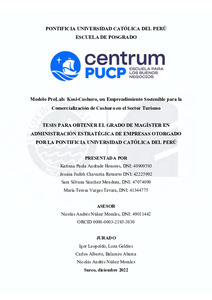| dc.contributor.advisor | Núñez Morales, Nicolás Andrés | |
| dc.contributor.author | Andrade Honores, Karinna Paola | |
| dc.contributor.author | Chavarría Retuerto, Jessica Judith | |
| dc.contributor.author | Sánchez Mendoza, Sara Silvana | |
| dc.contributor.author | Vargas Távara, María Teresa | |
| dc.date.accessioned | 2023-02-17T20:08:14Z | |
| dc.date.available | 2023-02-17T20:08:14Z | |
| dc.date.created | 2022 | |
| dc.date.issued | 2023-02-17 | |
| dc.identifier.uri | http://hdl.handle.net/20.500.12404/24317 | |
| dc.description.abstract | En la actualidad, la necesidad de recuperación del sector de alimentos y bebidas
posterior a la pandemia obliga a que la innovación sea un eje central en las propuestas de
valor de restaurantes y hoteles. En tal sentido, se identificó un problema complejo, que es la
búsqueda continua de la renovación de las propuestas gastronómicas en base a las tendencias
actuales de consumo saludable y de productos nativos.
Para abordar este problema se aplicó design thinking, donde a través de la empatía se
pudo identificar claramente las necesidades del cliente, para posteriormente plantear distintos
prototipos que fueron testeados para generar un aprendizaje validado a fin de definir un
producto mínimo viable.
De esta manera, la solución que se propone es Kusi-Cushuro, un producto basado en
el procesamiento del Nostoc sphaericum, conocido con el nombre de “Cushuro”,
“Murmunta” y “Llullucha”, etc, que es una cianobacteria de agua dulce con alto valor
nutricional, para su venta a hoteles de 4 y 5 estrellas de la zona centro y sur del Perú. Kusi Cushuro desarrollará sus actividades con un enfoque de sostenibilidad ambiental y social, en
donde se velará por una extracción inteligente y sostenible del recurso, buscando minimizar
el impacto al medio ambiente en la operación del negocio, además de tener un impacto
positivo en la calidad de vida de las comunidades que extraen la cianobacteria, con miras a la
optimización de su productividad.
En relación a la viabilidad financiera de Kusi-Cushuro, el proyecto tiene un VAN de
USD783,114 lo cual representa una iniciativa de alto valor para los inversionistas. En cuanto
al impacto social del negocio, Kusi-Cushuro tiene una influencia directa en el ODS 8,
teniendo un IRS de 33.3%, generando un VAN Social de USD835,300. A partir de los
antecedentes expuestos, se recomienda su implementación, así como la continua evaluación
de la escalabilidad del negocio a otros lugares de Perú y del mundo. | es_ES |
| dc.description.abstract | Currently, the need for recovery of the food and beverage sector after the pandemic
forces innovation to be a central axis in the value propositions of restaurants and hotels. In
this sense, a complex problem was identified, which is the continuous search for the renewal
of gastronomic proposals based on current trends in healthy consumption and native
products.
Design Thinking was applied to address this problem, where through empathy it was
possible to clearly identify the client's needs, to later propose different prototypes that were
tested to generate validated learning in order to define a minimum viable product.
The proposed solution is Kusi-Cushuro, a product based on the processing of Cushuro
(algae with high nutritional value) for sale to 4 and 5-star hotels in the central and southern
areas of Peru. Kusi-Cushuro will develop its activities with a focus on environmental and
social sustainability, where it will ensure an intelligent and sustainable extraction of the
resource, seeking to minimize the impact on the environment in the operation of the business,
in addition to having a positive impact on quality of life of the communities that extract the
algae, with a view to optimizing their productivity.
Regarding the financial viability of Kusi-Cushuro, the project has a NPV of
USD783,114, which represents a high value initiative for investors. Regarding the social
impact of the business, Kusi-Cushuro has a direct influence on SDG 8, having an IRS of
33.3%, generating a Social NPV of USD835,300. Based on the exposed background, its
implementation is recommended, as well as the continuous evaluation of the scalability of the
business to other places in Peru and the world. | es_ES |
| dc.language.iso | spa | es_ES |
| dc.publisher | Pontificia Universidad Católica del Perú | es_ES |
| dc.rights | info:eu-repo/semantics/openAccess | es_ES |
| dc.rights.uri | http://creativecommons.org/licenses/by-nc-nd/2.5/pe/ | * |
| dc.subject | Negocios--Planificación | es_ES |
| dc.subject | Emprendimiento--Perú | es_ES |
| dc.subject | Sostenibilidad empresarial | es_ES |
| dc.subject | Algas--Industria y comercio | es_ES |
| dc.title | Modelo prolab: Kusi-Cushuro, un emprendimiento sostenible para la comercialización de cushuro en el sector turismo | es_ES |
| dc.type | info:eu-repo/semantics/masterThesis | es_ES |
| thesis.degree.name | Maestro en Administración Estratégica de Empresas | es_ES |
| thesis.degree.level | Maestría | es_ES |
| thesis.degree.grantor | Pontificia Universidad Católica del Perú. CENTRUM | es_ES |
| thesis.degree.discipline | Administración Estratégica de Empresas | es_ES |
| renati.advisor.dni | 49011442 | |
| renati.advisor.orcid | https://orcid.org/0000-0003-2193-3830 | es_ES |
| renati.author.dni | 40909593 | |
| renati.author.dni | 42225992 | |
| renati.author.dni | 47074090 | |
| renati.author.dni | 41344775 | |
| renati.discipline | 413307 | es_ES |
| renati.juror | Igor Leopoldo Loza Geldres | es_ES |
| renati.juror | Carlos Alberto Balarezo Abarca | es_ES |
| renati.juror | Nicolás Andrés Núñez Morales | es_ES |
| renati.level | https://purl.org/pe-repo/renati/level#maestro | es_ES |
| renati.type | https://purl.org/pe-repo/renati/type#tesis | es_ES |
| dc.publisher.country | PE | es_ES |
| dc.subject.ocde | https://purl.org/pe-repo/ocde/ford#5.02.04 | es_ES |







